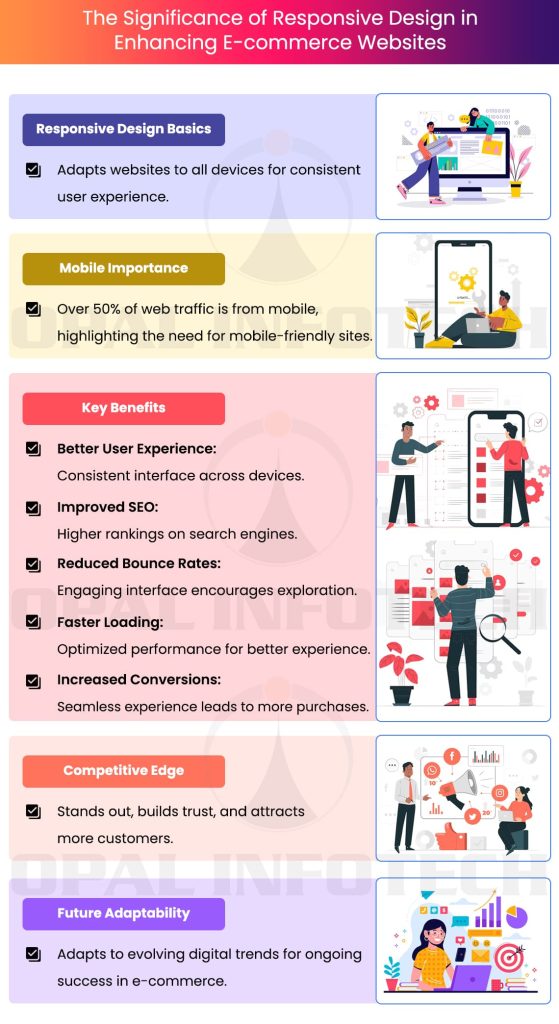In the rapidly evolving digital environment of today, the prosperity of an e-commerce website relies on numerous pivotal factors. Each element, ranging from compelling product descriptions to a streamlined checkout process, assumes a crucial role in both drawing in and retaining customers. Despite this, there is an aspect frequently underestimated but of utmost importance: responsive design. In this article, we will delve deep into the significance of responsive design for e-commerce websites and why it’s a critical factor for achieving success in the online retail world.
Understanding Responsive Web Design
Before we dive into its importance, let’s first clarify what responsive web design means?. Responsive design is a web design approach that seeks to ensure optimal rendering of web pages across a diverse range of devices and screen sizes. This implies that your e-commerce website should exhibit seamless appearance and functionality on desktop computers, laptops, tablets, and smartphones alike. Whether a potential customer is accessing your site from a 27-inch desktop monitor or a 5-inch mobile phone screen, they should have a consistent and user-friendly experience.
The Mobile Revolution
The prevalence of smartphones and the ease of internet access on mobile devices have caused a significant shift in online consumer behavior. According to Statista, as of 2021, mobile devices accounted for over 50% of global website traffic. This trend emphasizes the critical importance of ensuring that your e-commerce website is not only mobile-friendly but also responsive.
Improved User Experience
One of the key advantages of responsive design is the enhancement of the user experience. Visitors to your e-commerce site anticipate a seamless and user-friendly interface. With responsive design, your website adjusts to the user’s device, ensuring optimal viewing and interaction irrespective of the screen size. This results in heightened customer satisfaction and increased engagement with your content and products.
Enhanced SEO Performance
Search engine optimization (SEO) is a pivotal element in generating organic traffic for your e-commerce website. Responsive design contributes significantly to SEO, especially considering Google, the world’s leading search engine, prioritizes mobile-responsive websites in its search results. Consequently, an e-commerce website with responsive design is more likely to secure higher rankings in search engine results pages (SERPs), ultimately drawing in more organic traffic and potential customers.
Lower Bounce Rates
The bounce rate signifies the proportion of visitors who exit your website after engaging with just one page. Elevated bounce rates pose a risk to your e-commerce venture, suggesting that users may not discover what they seek or encounter a subpar user experience. Responsive design serves as a remedy to reduce bounce rates by furnishing a user-friendly interface. This, in turn, prompts visitors to delve deeper into your website, peruse additional products, and, ultimately, engage in more purchases.
Faster Page Loading
Page loading speed is a crucial factor influencing both user experience and SEO. Websites that load slowly often frustrate users and may lead to abandonment. Responsive design is associated with faster page loading times, optimizing the site’s performance across various devices. This not only contributes to a positive user experience but also enhances SEO rankings.
Increased Conversion Rates
The ultimate goal of any e-commerce website is to convert visitors into customers. A responsive design is essential for this goal. When users have a seamless experience on your site, they are more likely to stay, explore, and complete their purchase. A user-friendly, responsive design has the potential to substantially elevate your conversion rates, resulting in increased sales and revenue.
Competitive Advantage
In the fiercely competitive realm of e-commerce, possessing a responsive website can confer a distinct advantage over competitors who have not yet optimized their sites for mobile and other devices. Delivering a superior user experience can distinguish your e-commerce business and allure more customers.
Building Trust
Trust is a crucial element in e-commerce. Building trust is a pivotal prerequisite for customers to feel confident in making a purchase from your website. A responsive design conveys professionalism and reliability, reassuring visitors that your e-commerce business is credible and committed to providing a top-notch experience.
Future-Proofing Your Business
In the ever-changing digital landscape, characterized by the constant emergence of new devices and varying screen sizes, the adoption of responsive design becomes an invaluable investment for your e-commerce business. This strategic choice not only accommodates the current technological landscape but also future-proofs your website. The seamless adaptation to novel technologies and devices ensures an ongoing capability to attract and engage customers effectively. In conclusion, responsive design stands as a cornerstone for the enduring success and adaptability of your e-commerce venture in the dynamic digital era.
Conclusion
In conclusion, the importance of responsive design for e-commerce websites cannot be overstated. Responsive design is not merely a feature; it’s a necessity in today’s mobile-centric world. It goes beyond enhancing user experience; it also improves SEO performance, reduces bounce rates, and increases conversion rates. It provides a competitive advantage, builds trust, and future-proofs your business. To succeed in the highly competitive e-commerce landscape, make responsive design a top priority for your website. Embracing responsive design will be appreciated by your customers, leading to increased engagement and higher sales.













